Shattered Globe summons blush as well as heat in Williams’ gritty comedy ‘The Rose Tattoo’
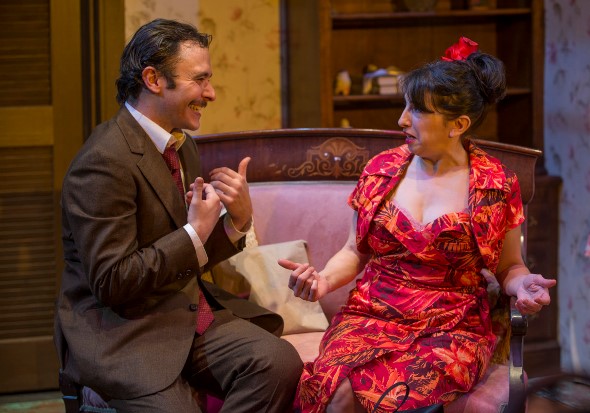 Review: “The Rose Tattoo” by Tennessee Williams, produced by Shattered Globe Theatre at Theater Wit, through Feb. 28. ★★★★
Review: “The Rose Tattoo” by Tennessee Williams, produced by Shattered Globe Theatre at Theater Wit, through Feb. 28. ★★★★
By Lawrence B. Johnson
When I look back on Chicago’s current theater season, certain performances will stand out as they always do for that singular blurring of actor and character that makes you feel more like you’re eavesdropping than watching a play. No doubt that special few will include Eileen Niccolai’s earthy, vulnerable, funny embodiment of Serafina Delle Rose in Tennessee Williams’ “The Rose Tattoo” with Shattered Globe Theatre.
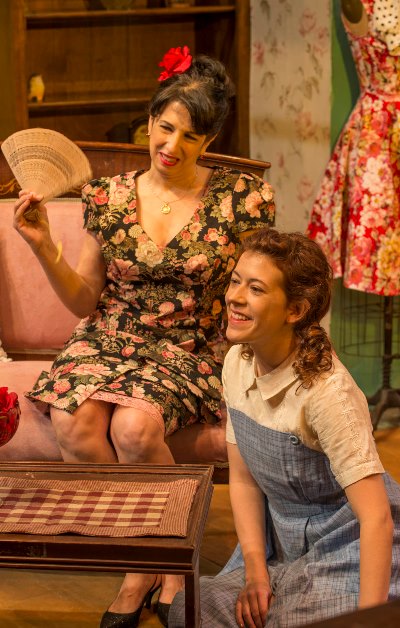 While “The Rose Tattoo” (1951), the playwright’s only fling at comedy, may not quite reach the same high rung as “The Glass Menagerie” or “Cat on a Hot Tin Roof,” this scintillating arabesque on a woman who overestimates her husband, grieves long and hard over his death, and finally reconnects with life is nonetheless a lovely play. Like a magic carpet, it fairly floats on Williams’ lyrical language – generously peppered with Italian.
While “The Rose Tattoo” (1951), the playwright’s only fling at comedy, may not quite reach the same high rung as “The Glass Menagerie” or “Cat on a Hot Tin Roof,” this scintillating arabesque on a woman who overestimates her husband, grieves long and hard over his death, and finally reconnects with life is nonetheless a lovely play. Like a magic carpet, it fairly floats on Williams’ lyrical language – generously peppered with Italian.
The story of the seamstress Serafina Delle Rose is set on the Gulf Coast, not far from New Orleans, in a community populated largely by Sicilians. On the threshold of middle age, Serafina is the proud mother of a 15-year-old daughter Rosa – and prouder still of her handsome husband, whom she married at age 14 and with whom (she never tires of repeating) she has made love every night from that day to the present.
We never see the husband, who by Serafina’s account has a splendid rose tattoo on his chest. He drives a banana truck, but the bananas are just a cover for smuggling. Everyone except Serafina seems to know that. When she receives word that her husband – this paragon of men – has been shot and killed by the police, Serafina all but dies in turn. For the next three years Serafina confines herself to her house, wearing only a soiled slip and working to meet a steady demand for her hand-made dresses and shirts. On a table, against the stern objectives of the village priest, she preserves the ashes of her sainted husband.
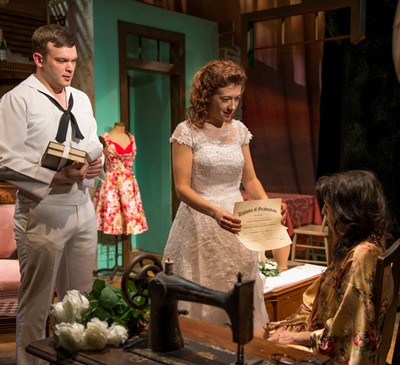 When flower-fresh Rosa finally meets a boy – worse an older boy, in fact a sailor home on leave – Serafina becomes the protective mother hen, spouting warnings and remonstrances and subjecting the amazed sailor to an impromptu inquisition. But fate has a double surprise in store for Serafina: a rising neighborhood buzz about her late husband’s infidelities, for one, and the appearance at her door of a handsome, brash, lovelorn young Italian man who happens to drive a banana truck. Just bananas, he assures the anxious woman. And with that, Serafina begins a wary, halting, petulant return to the world of the living.
When flower-fresh Rosa finally meets a boy – worse an older boy, in fact a sailor home on leave – Serafina becomes the protective mother hen, spouting warnings and remonstrances and subjecting the amazed sailor to an impromptu inquisition. But fate has a double surprise in store for Serafina: a rising neighborhood buzz about her late husband’s infidelities, for one, and the appearance at her door of a handsome, brash, lovelorn young Italian man who happens to drive a banana truck. Just bananas, he assures the anxious woman. And with that, Serafina begins a wary, halting, petulant return to the world of the living.
Eileen Niccolai is the very incarnation of Serafina, self-assured to a smug fault but in her confidence and optimism the envy of the Sicilian women who gossip on her street and buy her dresses. When Serafina’s world collapses, with the death of her glorified husband, Niccolai makes a transformation as grim and complete as it is sudden and impenetrable. We watch a woman surrender her self-respect as she squanders respectability, to become a foul, spiteful shadow of a once meticulous, proper lady.
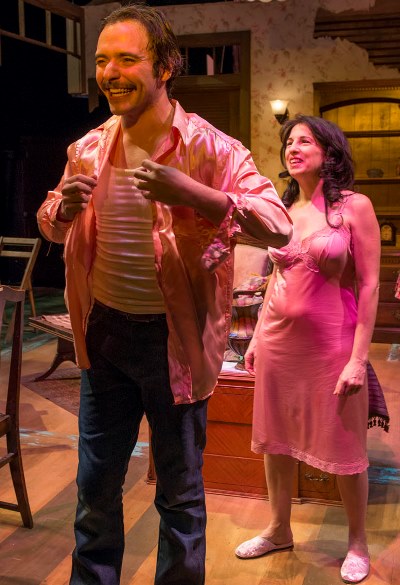 Yet Niccolai also brings an irresistibly droll edge to Serafina’s funk and fuming. She goes after annoying neighbors with a broom and reviles the one-eyed owner of a frequently escaped goat with streaming Sicilian epithets punctuated by physical gestures that transcend language. Though depressed and embattled and barely hanging on, this Serafina is a scrapper you can admire.
Yet Niccolai also brings an irresistibly droll edge to Serafina’s funk and fuming. She goes after annoying neighbors with a broom and reviles the one-eyed owner of a frequently escaped goat with streaming Sicilian epithets punctuated by physical gestures that transcend language. Though depressed and embattled and barely hanging on, this Serafina is a scrapper you can admire.
Enter Alvaro Mangiacavallo, banana truck driver, in the ebullient persona and lean form of Nic Grelli. One look at this fine young specimen – who bitterly acknowledges that his name means “eat a horse” – and Serafina is imploring her little statue of the Holy Virgin to explain why this man has appeared with the body of her husband and the head of a clown. For his part, this lusty youth sees in Serafina a very good body indeed, and he’s not clowning. She, however, is backpedaling.
They’re a delightful pair, Niccolai’s testy, reluctant Serafina and Grelli’s impulsive Mangiacavallo, circling and sparring and both wanting the same thing but only one of them quite understanding it. What has been virtually a one-woman tragicomedy with incidental support suddenly blossoms into a full-blown comedy for two, and Grelli leaps boldly into the picture bringing a truckload of charisma, comic finesse and sexual energy.
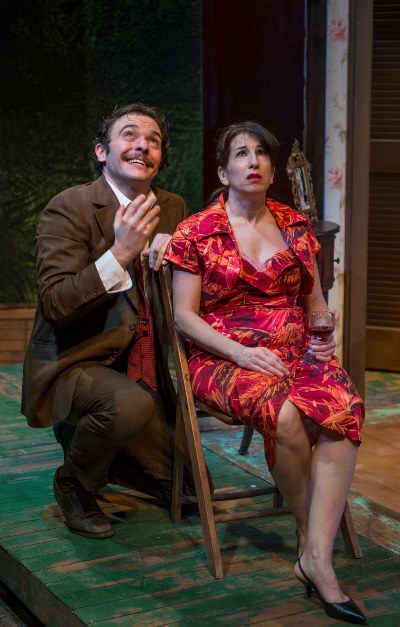 Williams’ subplot – daughter Rosa’s sexual awaking with her sailor – resonates as a touching echo of Serafina’s own girlhood, and Daniela Colucci and Drew Schad make an appealing young couple in full hormonal foment. Director Greg Vinkler adroitly manages their uneasy mating dance, constrained as it is by the sailor’s vow to Serafina that he will not violate Rosa’s innocence.
Williams’ subplot – daughter Rosa’s sexual awaking with her sailor – resonates as a touching echo of Serafina’s own girlhood, and Daniela Colucci and Drew Schad make an appealing young couple in full hormonal foment. Director Greg Vinkler adroitly manages their uneasy mating dance, constrained as it is by the sailor’s vow to Serafina that he will not violate Rosa’s innocence.
The flavorful combination of Sarah Ross’ detailed interior design for Serafina’s home and Sarah Jo White’s vibrant costumes gives the play a beguiling sense of immediacy. (Serafina spends much of the play in her ratty pink slip, putting one in mind of Maggie in “Cat on a Hot Tin Roof.” Be assured it’s not the same thing, not the same thing at all.)
Finally, and not least, Charles Cooper’s poetic lighting captures both the spirit and the flow of Tennessee Williams’ affectionate narrative. Still, the ultimate illumination here springs from the lovable, glowing Serafina. It is a huge role, and Niccolai delivers a bravura performance.
Related Link:
- Performance location, dates and times: Details at TheatreinChicago.com
Tags: Charles Cooper, Daniela Colucci, Drew Schad, Eileen Niccolai, Greg Vinkler, Nic Grelli, Sarah Jo White, Sarah Ross, Shattered Globe Theatre, Tennessee Williams, The Rose Tattoo, Theater Wit

